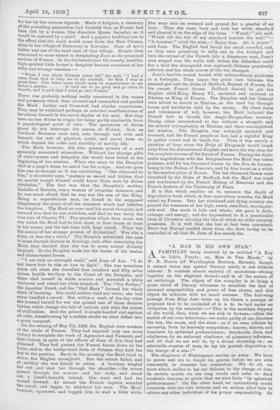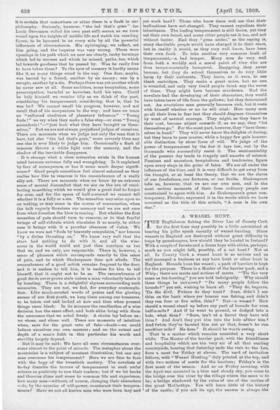"A MAN IS HIS OWN STAR."
APAMPHLET lately received by us entitled "A Key to Life's Puzzle ; or, Man in Two Moods," by W. B. Norris (of Warblington Rectory, Havant), though it cannot claim any special literary merit,' is not without interest. It consists almost entirely of quotations—strung together on the slightest thread—and 'is of the nature of an anthology. The object of the compiler is to bring a great cloud of literary witnesses to establish the fact of personal responsibility and power of free choice,, and this object he achieves with no small success. The following passage from King Lear sums up his thesis, a passage so poignant that to be reminded of it is to be laid under an obligation by the reminder :—" This is the excellent foppery of the world, that, when we are sick in fortune,—often the surfeit of our own behaviour,—we make guilty of our disasters the sun, the moon, and the stars : as if we were villains by necessity, fools by heavenly compulsion; knaves, thieve, • and tieachers by spherical predominance; drunkards, liars, and adulterers,' by an enforced obedience of planetary influence; and all that we are evil in, by a divine thrusting on ; an admirable evasion of man,' to lay his goatish disposition to
the charge of a star!" • •
The eloquence of Shakespeare carries us away. We have to pause and try to forget his genius before we are able reasonably to consider his contention. We do all, we must admit, incline to lay our failures to the charge of fate. In certain moods we use long words and refer to 'dead academic theories to prove that we were fools "by spherical predominance." On the other hand, we instinctively credit ourselves with our own success, and we seldom allow fate to ' relieve any other individual of his proper responsibility. So it is certain that someiyhere or other there is a fault in our philosophy. Seriously, however, "the lad that's gone" (as Louis Stevenson called his own past self) seems, as we turn round upon the heights of middle life and watch his receding figure, to be hemmed in on every side by all the powerful influences of circumstance. His upbringing, we reflect, set him going, and the impetus Was very strong. There were openinge in his path which we now see clearly, lucky turnings which led to success and which be missed, paths, too, which led towards goodness that he passed by. Was he really free to have taken them P To the eyes of memory it hardly seems like it, so many things stood in the way. One door, maybe, was barred by a friend, another by an enemy ; one by a tiemple, another by a sin. Perhaps there was yet another which he never saw at all. Some ambition, some temptation, some preoccupation, harmful or harmless, held his eyes. Could be help himself, we wonder idly as we think of the past, considering hie temperament, considering, that is, that be WAS be P We cannot recall his progress, however, and not recall that of his companions in the way ; and here we trace no "enforced obedience of planetary influence." "Young fools I" we cry when they make a false step—or even "Young scoundrels I "—"just look what they have brought on them- selves." But we are not always prejudiced judges of ourselves. There are moments when we judge not only the man that is here, but also "the lad that's gone," more severely than any one else is ever likely to judge him. Occasionally a flash of remorse throws a white light over the memory, and the shadow of the inevitable disappears.
It is strange what a close connexion exists in the human mind between extreme folly and wrongdoing. Is it explained by fear of consequence, or has it some much deeper eignifi- entice P Good people sometimes feel almost ashamed as they realise how like to remorse is the remembrance of a really silly act. There are moments when we know by an extreme sense of mental discomfort that we are on the eve of recol- lecting something which we would give a great deal to forget for ever, and for the space of half-a-second we cannot tell whether it is 'a folly or a sin. The sensation may seize upon us on waking, or may come in the course of conversation, when the talk vaguely threatens our memory and we are not sure from what direction the blow is coming. But whether the first sensation of pain should turn to remorse, or to that fearful twinge of self-ridicule which simulates it so nearly, in either case it brings with it a peculiar clearness of vision. We know we were not "fools by heavenly compulsion," nor knaves " by a divine thrusting on." We know very well that the stars had nothing to do with it, and all the wise- acres in the world could not just then convince us but that we, and we only, are responsible. There is, however, a sense of pleasure which corresponds exactly to this sense of pain, and to which Shakespeare does not allude. The remembrance of a good action remains fragrant to the doer, smd it is useless to tell him, it is useless for him to tell himself, that it ought not to be so. The remembrance of good deeds never grows stale unless a man voluntarily taints it by boasting. There is a Zelightful shyness surrounding such memories. They are not, we feel, for everyday contempla- tion. Like much-coveted words of praise and the glowing scenes of our first youth, we keep them among our treasures, to be taken. out and looked at now and then when present things teem black; In its measure the recollection of a wise decision has the same effect, and both alike bring with them the assurance that we acted freely. A choice lay before us : WA chose, and chose well. There are moments of intuition when, save for the great veto of fate—death—we oould believe ourselves our own masters ; and on the extent and depth of a man's faith in this particular his worth and stability largely depend.
But it may be said: We have all seen circumstances over- come almost to the point of miracle. The metaphor about the mountains is a subjeot of constant illustration, but can any man overcome his temperament? Here we are face to face with the bogy of the twentieth eenthry. The novelists of to-day describe the terrors of temperament in such awful colours as positively to cow their readers; but if we let books and theories alone and come to common life and experience, bow many men—without, of course, changing their characters —do, by the exercise of will-power, counteract their tempera- ments ? Have we not all known men who were born lazy and yet work hard ? Those who know them well see that their inclinations have not °hanged. They cannot repudiate their inheritance. The loafing temperament is still theirs, yet they eat their own bread, and many other people eat it too, and not without butter. Had they "gone under," as the saying is, many charitable people would have charged it to their stars, but in reality it would, as they very well .know, have been their own fault. To take another very common fault of temperament,—a bad temper. Many men do rely well from both a worldly and a moral point of view who are thus temperamentally hampered. Easygoing they never become, but they do school themselves to do very little harm by their outbursts. They learn, as it were, to nse blank cartridges. They make a great noise, but no one is wounded, and only very timid people think any the worse of them. They might have become murderers. Had the novelists bad the developing of their characters, they would have taken leave of life from the gallows; but they determined not. An avaricious man generally becomes rich, but it rests with himself whether or no lie will steal. How many men go all their lives in fear lest they should disgrace themselves by want of natural courage. They might, as they know to their cost, become abject cowards if, as we say, they "let themselves go." For the most part, however, they "have them- selves in hand." They will never know the delights of daring, but they learn to pass muster, while a happy few gain honour- able distinction by sheer force of will. We judge of the power of temperament by the few it lays low, not by the thousands who successfully resist it. The sentimentality of the present day tends to tragedy and smacks of science. Passions and ancestors, temptations and tendencies, figure upon every stage in the guise of fates. We are all under the influence of the time, and it is very difficult to get away front the thought, or at least the theory, that we are the slaves of our forefathers, our fortunes, or our faults. Shakespeare tells us, however, that we are our own men, and in the most !serious moments of their lives ordinary people are constrained to agree with him. As Sha,kespeare's great con- temporary, Fletcher, expressed it in the words which we have borrowed as the title of this article, "A man is his own star."























































 Previous page
Previous page